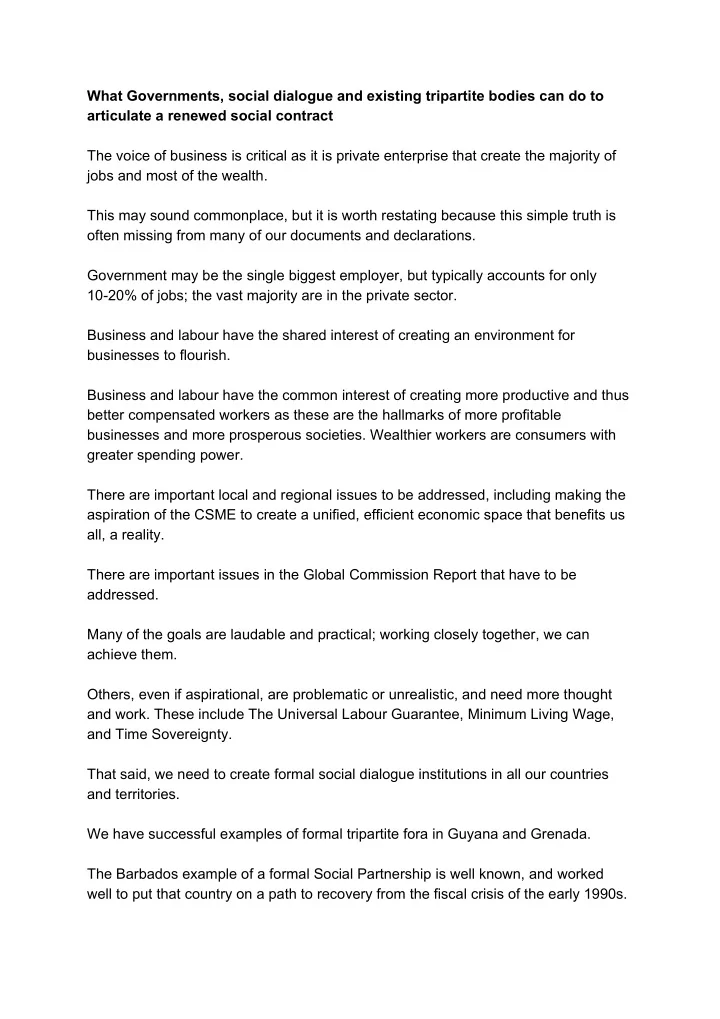

What Governments, social dialogue and existing tripartite bodies can do to articulate a renewed social contract The voice of business is critical as it is private enterprise that create the majority of jobs and most of the wealth. This may sound commonplace, but it is worth restating because this simple truth is often missing from many of our documents and declarations. Government may be the single biggest employer, but typically accounts for only 10-20% of jobs; the vast majority are in the private sector. Business and labour have the shared interest of creating an environment for businesses to flourish. Business and labour have the common interest of creating more productive and thus better compensated workers as these are the hallmarks of more profitable businesses and more prosperous societies. Wealthier workers are consumers with greater spending power. There are important local and regional issues to be addressed, including making the aspiration of the CSME to create a unified, efficient economic space that benefits us all, a reality. There are important issues in the Global Commission Report that have to be addressed. Many of the goals are laudable and practical; working closely together, we can achieve them. Others, even if aspirational, are problematic or unrealistic, and need more thought and work. These include The Universal Labour Guarantee, Minimum Living Wage, and Time Sovereignty. That said, we need to create formal social dialogue institutions in all our countries and territories. We have successful examples of formal tripartite fora in Guyana and Grenada. The Barbados example of a formal Social Partnership is well known, and worked well to put that country on a path to recovery from the fiscal crisis of the early 1990s.
It will be central to its recovery from the current crisis. Jamaica has had the Labour Advisory Committee of its Ministry of Labour, a formalised tripartite body that was created in the early 1990s. Since then Jamaica has formalised a Social Partnership in 2102 and used social dialogue bodies to engineer two debt renegotiations and a new electricity arrangement with significantly lower costs. A social dialogue approach has seen Jamaica reduce its debt/GDP ratio from 140% to 96% in less than a decade, a feat hitherto unthinkable; and done with no labour strike or mass upheaval. I outline these successful examples of social dialogue as the easiest selling point for a renewed social contract; tangible wins in similar circumstances are persuasive arguments. There are long outstanding issues in the Caribbean that need social dialogue, including new working arrangements to address the needs of the workplace and workforce of the future. Telework is an opportunity for our people as the internet has made geography redundant for many services, and leveled the global playing field. This presents a challenge for us, but also a great opportunity to create many new jobs. Employers have pushed for changes to the legal and regulatory environment to facilitate this. Outsourcing is producing tens of thousands of jobs in the region, and our traditional models of ‘work’ must put on their running shoes to keep up with this ever-evolving opportunity. These developments need a reconfiguration of the social safety net, when even the concept of an employer who bears a significant share of the cost becomes less clear as more workers effectively become self-employed. A robust social safety net will have to be paid for, and the contributions need to come from the entire society. I am happy to hear the constant call for the “Private Sector to play a greater role”, but it often seems to be more about governments grabbing a bigger share of profits and less about collaborating on creating the ecosystem that facilitates more and better businesses. Employers stand ready to be a meaningful partner in creating this new ecosystem.
We have important work to do on educating and training our people to make them market-ready; on improving productivity; on formalising our economies. Nothing succeeds like success, and we gathered here, if we are willing to listen, can learn from each other, and build on the successful examples that we have created among ourselves. “If you want to go fast, go alone. If you want to go far, go together.” - African Proverb Wayne Chen President, Caribbean Employers’ Confederation 15 May 2019
Recommend
More recommend